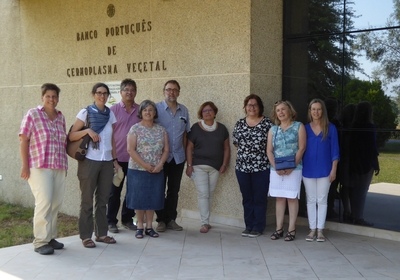Improving the characterization and conservation of umbellifer crop wild relatives in Europe
Activity Coordinator: Charlotte Allender

| The CarrotDiverse Activity is sponsored by the Government of the Federal Republic of Germany. |
The project "Improving the characterization and conservation of umbellifer crop wild relatives in Europe". submitted by the Umbellifer crops Working Group under the Fourth Call of the ECPGR Activity Grant Scheme, was selected by the Executive Committee and awarded in December 2016.
- Activity proposal (124,5 KB)
Implementation
March 2019
The duration of the Activity was extended by 6 months, till 30 September 2019, with a budget revision. This will allow performing the following additional tasks:
- Genotyping using the GBS protocol of a further 96 samples of wild carrot. Data analysis on the entire dataset can then be carried out, potentially linking genotype to disease resistance, morphological phenotype and polyacetylene profile for the entire set of ca. 200 samples. Data analysis will be carried out by JKI, Quedlinburg.
- Continuation of the work started in the first year of the project ensuring that an outline is described of the potential European contribution towards a global conservation strategy for Daucus genetic resources. This will mainly be undertaken as a desk study by the University of Warwick, and will involve seeking input from key organisations.
November 2018
The second expert meeting was held 13-14 November 2018 in Zaragoza, Spain.
- Meeting report (49,3 KB)
- Agenda (26,8 KB)
- List of participants (35,2 KB)
September 2018
A second season of morphological characterization is almost complete. Material for Genotyping-By-Sequencing, Alternaria resistance screening and polyacetylene profiling is being grown out at the JKI. The second expert meeting will be held 13-14 November 2018 in Zaragoza, Spain, to assess the characterization approach and discuss preliminary results and other potential analytical approaches for project data.
June 2018
A second season of morphological characterization is underway and selected accessions have been sown and transplanted. Material for Genotyping-By-Sequencing, Alternaria resistance screening and polyacetylene profiling has been compiled and the work is underway. The second expert meeting is planned to be held in Zaragoza, Spain in November 2018, to assess the characterization approach and discuss preliminary results. Requirements for global conservation of Daucus accessions will also be addressed. The definition of a panel of key Daucus CWR accessions from European genebanks for inclusion in the European Collection is the expected outcome after completion of the characterization exercise.
February 2018
The activity focuses on characterization and replicated trials of wild carrot accessions at different latitudes. During 2017, a first batch of 30 accessions (15 from France and 15 from UK) was tested in France, Portugal and Sweden. Analysis of the data from the three trials is in progress. These will give indications about latitudinal adaptation of the tested accessions, as well as regarding the effect of environment on descriptors and therefore will help in the choice of descriptors that are environment-independent.
Wild carrot accessions from France, Germany, Portugal, Nordic countries and the UK are being prepared for testing their resistance to Alternaria diseases. In 2018, resistance tests will be carried out at JKI, Quedlinburg, followed by Genotyping by Sequencing.
The second expert meeting is planned to be held in Zaragoza, Spain in 2018 (dates to be defined), to assess the characterization approach and prioritize samples for Genotyping by Sequencing. Requirements for global conservation of Daucus accessions will also be addressed.
The definition of a panel of key Daucus CWR accessions from European genebanks for inclusion in the European Collection is the expected outcome after completion of the characterization exercise.
July 2017
The first meeting of the CarrotDiverse partners was held 4-5 July 2017 in Braga, PortugaL
- Meeting report (425,2 KB)
- Agenda (166,2 KB)
- List of participants (83,2 KB)
- Presentations given at the meeting
